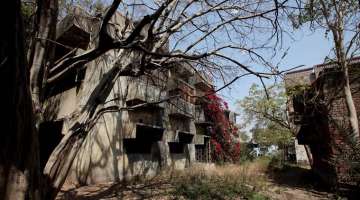Gulberg Society massacre: Tracing the 14-year trial through 11 developments
Ahmedabad: A special SIT court today convicted 24 of the 66 accused in the 2002 Gulberg society massacre case that killed 69 people including former Congress lawmaker Ehsan Jafri. The court has also acquitted 36

Ahmedabad: The special SIT court that convicted 24 of the 66 accused in the 2002 Gulberg society massacre case that killed 69 people including former Congress lawmaker Ehsan Jafri, has deferred the date to pronounce the quantum of punishment to June 9. \
The court has also acquitted 36 of the accused in the case.
While the prosecution is likely to seek capital punishment for the 11 convicted and charged with murder, the victims' lawyer may seek life imprisonment for them.
Among the 66 accused, five died during the trial, which has been conducted under four judges. One of the accused, Bipin Patel, who is a BJP councillor, has been acquitted. He is a sitting BJP corporator from the Asarwa area. He was accused of being part of the mob and was charged with murder. Patel was the corporator in 2002 too and has won multiple elections since.
However, Jafri's wife Zakia today expressed her dissatisfaction over court's verdict, saying, "I am very unhappy with the judgement. I will carry on the fight, will do whatever it takes."
The special court's verdict came 14 years after the incident in which 69 people, including former Congress MP Ehsan Jafri were charred to death.
Here is the complete timeline of events
1)
On February 28, 2002, during the 2002 Gujarat riots, the Gulberg society was attacked by a 20,000-strong mob, which breached the boundary wall and started torching houses. Most of the houses were burnt. By evening, 69 people, including former Congress MP Ehsan Jafri were charred to death. Hearing the mob, many of the residents took refuge in the home of former Congress MP Ehsan Jafri , but Jafri was unable to protect himself and other residents of the society. Jafri was hacked to death and later burnt.
The mob had attacked Gulberg a day after coaches of the Sabarmati Express train were burnt at Godhra station leaving 59 people dead.
The Gulberg Society was a cluster of 29 bungalows and 10 apartment buildings in Chamanpura locality of Ahmedabad. The society was housing upper middle class families, mostly belonging to the minority community.
2)
On June 8, 2006, Zakia Jafri, widow of Ehsan Jafri first made the complaint alleging that the police had not registered the FIRs against Gujarat Chief Minister Narendra Modi, and 62 others including several ministers alleging a conspiracy to allow the massacre.
3)
In October 2007, Tehelka carried out a sting operation wherein 14 VHP or Bajrang Dal activists, including, Madan Chawal, a Gulberg Society massacre accused, and a BJP MLA from Godhra, Haresh Bhatt who was national vice-president of Bajrang Dal during the riots, were shown talking about the execution of the killings.
4)
On November 3, 2007, Zakia Jafri approached the Gujarat High Court with her complaint but the court refused to entertain her plea, and instead asked her to present the case before magistrate's court.
5)
The Supreme Court, on March 26, 2008, ordered the Narendra Modi government to re-investigate 10 cases in the 2002 Gujarat riots, including the Gulberg Society massacre.
6)
Zakia Jafri later approached the Supreme Court, which on April 27, 2009, appointed a five-member Special Investigation Team (SIT) headed by R K Raghavan, a former head of the CBI, to investigate into the Gujarat riot cases.
7)
In March 2010, SIT summoned Narendra Modi to give an explanation regarding accusations against him in the murder of Ehsan Jaffri and others at Gulberg society. The interrogation lasted for over nine hours. Later on, in 2012, the SIT gave a clean chit to Modi, stating that there was no prosecutable evidence against him.
8)
In March 2010, the Gulberg Society case trial was stayed by the Supreme Court.In its closure report filed the SIT submitted that Jafri was killed because he provoked a “violent mob” that had assembled “to take revenge of Godhra incident" from the Muslims.
9)
Zakia Jafri filed a protest petition on April 15, 20 objecting to the Supreme Court-appointed SIT's closure report absolving Modi of complicity in the conspiracy behind the carnage.
10)
But on December 26 2013, the metropolitan court rejected the protest petition filed by Zakia Jafri and gave clean chit to Narendera Modi.Metropolitan Magistrate B J Ganatra while pronouncing the order in open court told Zakia's counsel Mihir Desai that her petition has been rejected and they have the liberty to approach a higher court.
11)
The trial in the Gulberg Society case, resumed in November 2014 following the Supreme Court’s directions to conclude it in three months.
Collectively, the riots in Gujarat in 2002 claimed over 1,000 lives and injured over 2,000 people. As per official numbers, 790 Muslims and 254 Hindus died during the rioting period.